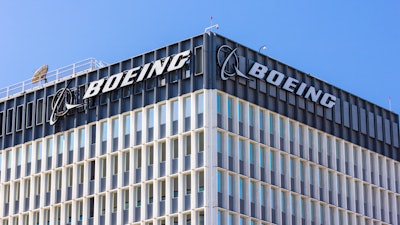
EVERETT, Wash. (AP) — Boeing will spend millions of dollars and decades cleaning up pollutants that have seeped into the soil and groundwater beneath one of their plants in Washington state, a state-mandated draft proposal said. TCE, or Trichloroethylene, is one of many pollutants that have been found in groundwater near Boeing's Everett, Washington, plant, the Daily Herald reported Sunday.
TCE is a solvent that is used to degrease metal parts and is a carcinogen to humans. The U.S. Environmental Protection Agency said in 2016 that TCE can also affect fetus development, irritate the respiratory system and cause light-headedness, drowsiness and headaches. The National Cancer Institute considers TCE a "cancer-causing substance."
Last year, the solvent was detected in groundwater near the plant at a concentration more than 1,000 times the state limit.
"Boeing is in the final stages of environmental cleanup at our Everett site, under a draft set of studies, plans and orders and other documents available for public comment from the Washington Department of Ecology," the company said in a written statement. "We are committed to a comprehensive cleanup of the Powder Mill Gulch area of Everett and have made considerable progress in reducing groundwater contamination through a variety of interim action cleanup activities."
The full cost of the cleanup is not publicly known. Boeing declined to say what the cleanup is expected to cost.
Several other contaminants have been discovered at the roughly 1,000-acre (405 hectares) Boeing site. The contaminants include fuels such as oil, gasoline, lead, hydraulic jet fluid, polychlorinated biphenyls and carcinogenic polycyclic aromatic hydrocarbons. The chemicals came from a range of manufacturing operations, according to the cleanup documents.
Boeing "no longer uses TCE as a widespread cleaning solvent as it did in the past," the department said. Small quantities of the chemical are still used in one of its labs, according to the Washington State Department of Ecology.
The most expensive and time-consuming part of the Everett cleanup plan involves a process known as bioremediation, in which Boeing will inject nutrients into the soil to help natural bacteria break down TCE. Boeing would invest heavily in improvements to an existing system that pumps out contaminated groundwater, treats it then releases it, according to the proposal.
The state-mandated draft proposal is 163 pages and will open for public comment on April 19.






















